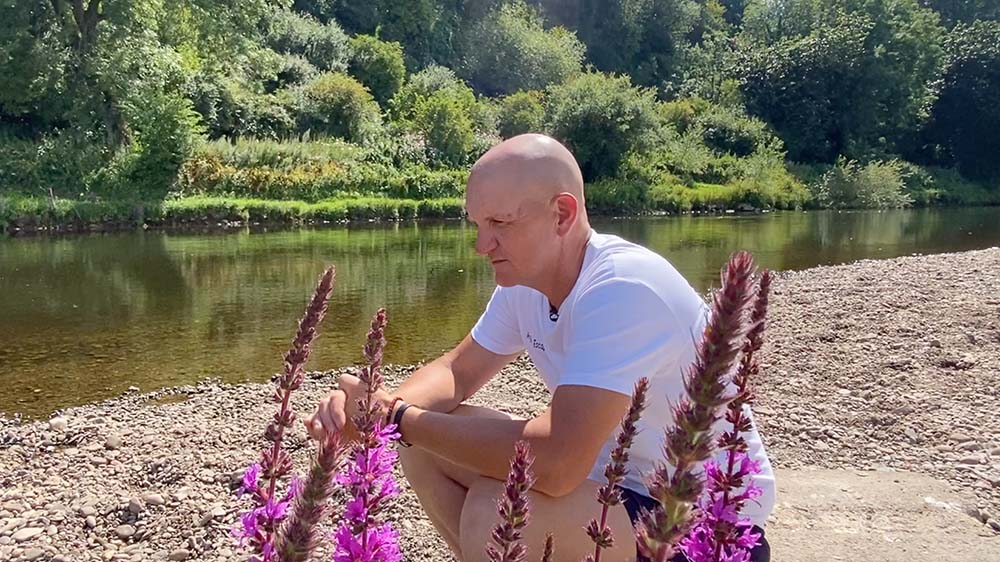In the heart of Herefordshire, an angler defies the naysayers who claim the river is polluted. With every cast, he seeks to prove that the waters he spends all day in are teeming with life.
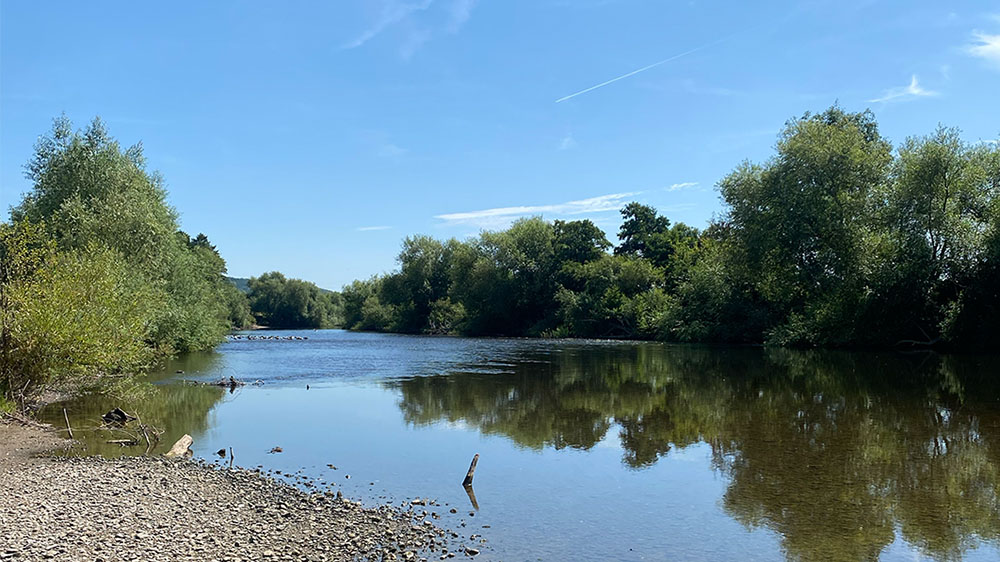
On the sunniest and warmest day of the year in the United Kingdom, David Roberts arrived in Hampton Bishop. He spent yet another day in the picturesque Wye Valley pursuing his favorite pastime: fishing.
As he took a couple of steps into the cascading flow of the River Wye, he looked down at the water to be met with a school of fry, minnow and patches of ranunculus plants wrapped around his feet .
In contrast to the overwhelming negative press regarding agricultural pollution in the river Wye, he is one of the few anglers that publicly acknowledges that the situation may not be as dire as it appears.
“When I first started to hear lots of talk about poultry farming and that it had this detrimental effect on the river, I never believed that for one second,” David says. “From that moment on I always questioned the rhetoric behind the river movement.”
Upon arriving, David requested that I wear a pair of nylon pants prior to our departure for the river. Surprisingly, with the right mindset, any pair of nylon pants can be suitable for fishing.
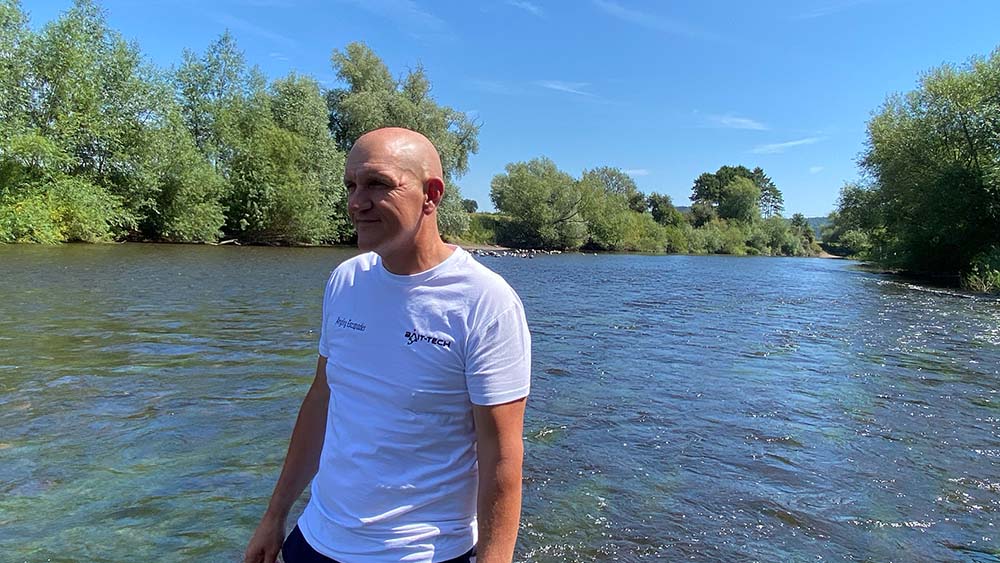
With a “can-do” mindset, Dave donned khaki shorts, an “Angling Escapades” t-shirt that advertised his business, and speedo sunglasses, exuding a readiness to unveil the river’s true nature to me.
On our initial stop, we explored the one of the fishing posts of the river Wye known as “Carrots Stream.” This fishing destination is situated close to the Bunch of Carrots pub in the heart of the village. David and his fishing companions frequent this location with the intention of catching Atlantic salmon.
“Some of these names are so anglers can keep track of where the best spots are to fish. It also can tell a story along the Wye, which is quite nice,” says David.
We parked nearby and stood behind a fence outside the pub, allowing us a scenic view of the river. With great enthusiasm, David frequently drew our attention to the captivating spectacle of fish leaping out of the water.
Looking out at the stretch, we pointed out the amount of fish that were jumping out from the water as we stood behind the fence. There were times where he would examine the water and whisper in excitement when he would see the sleek, silver body shimmering of a fish under the dappled sunlight, almost like a kid.
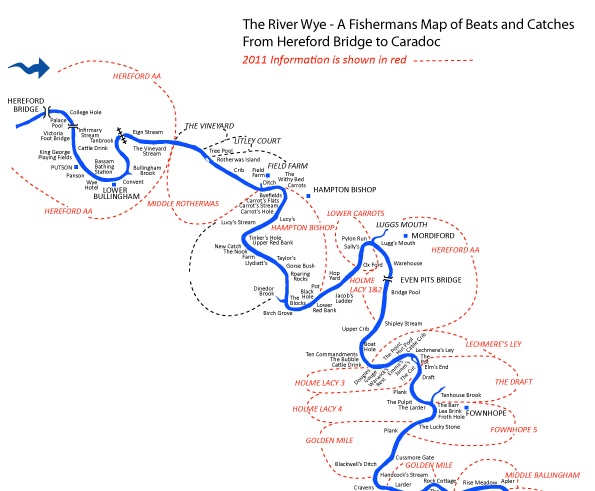
“This is one of our best salmon pools, one of the best on the Wye I would say,” David says. “We still catch loads of salmon here and then when we’re done, we just head over to the pub.”
Since he was four years old, David has spent his free time on river Wye before it became a business for him. He recalls spending time with his late father who showed him the ropes of salmon fishing.
However, fishing isn’t the only thing he does, though. David also owns his own automotive business that takes over the distribution of collision repair equipment in the UK.
When hes out on the river, David has consistently achieved an impressive average catch of 200 pounds of fish in just five hours. However, despite his remarkable results, he remains perplexed by the widespread concern over pollution in the river.
As exciting as it was to see fish, he mentioned it was a reminder to David on how he feels about the activism surrounding the Wye, which he feels should be focusing on the irrigation and sewage issues in the UK and not poultry farming.
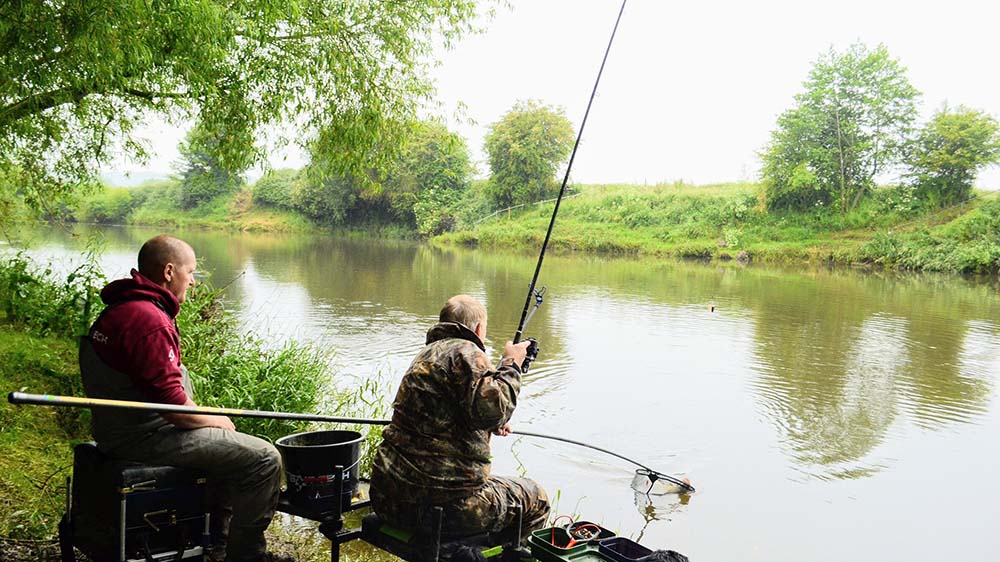
“This river has almost become the poster boy for pollution. It’s good that we’re talking about our rivers but what’s become apparent is the sewage issue, which is bigger than anything,” says David.
The news surrounding Britain’s beloved rivers, the River Wye, has stated it is breaching an environmental catastrophe from intensive agricultural practices. Within the Wye catchment, anglers have the opportunity to catch a diverse range of fish species.
According to Natural Resources Wales, rod catches have been relatively stable since 2012, and the outlook for Wye salmon was promising. Recent data has suggested a recent shift has occurred but that hasn’t stopped David’s business from booming..
“We’re seeing life still be in this river. It all seems to be getting swept under the carpet because there’s lots of non- profit organizations that only care about the bad issues about the Wye,” says David.
Data from the Environment Agency has also suggested that the amount of ranunculus weeds in the Wye has decreased tremendously since 2019. Along with this are other species that were noted to decline such as Atlantic salmon and white crayfish, all due to agricultural and industrial pollution.
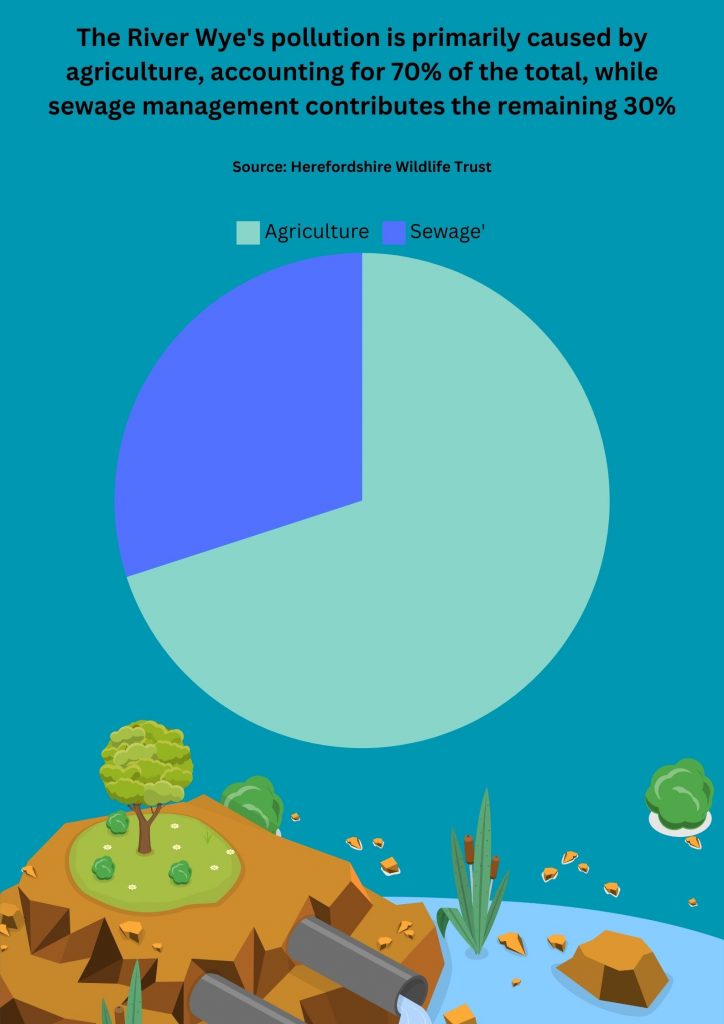
River activist groups have tried to take matters into their own hands to figure out who the culprits are for their lack of care surrounding the river. Groups that work alog the river like Friends of the River Wye and River Action use citizen scientists and legal presidents to push back on the EA’s misregulation of the river.
Anglers like David, however, are stepping back and questioning whether or not there is any pollution to begin with.
“Theres lots of good things going on in the river, with the citizen scientists. They’re monitoring changes in the river, but they’re only focusing on the current state as “bad”, but to me, it’s pretty good. For some it’s about saving the Wye, but for me it’s about protecting what we already have, because what we have got is pretty good” says David.
We started to drive down further into the valley to see more of the river. We stopped at another fishing post, known as “The Farm”, and hopped out the truck. Dave immediately leapt into the water while I stood by to watch what he was going to grab.
He started pulling up from the water with his hands and came over to show me that he was holding a handful of what appeared to be little leeches and natural larvae. The small, delicate nature of these organisms was somewhat funny to look at because it was a reminder that the smallest beings can exist in our river.
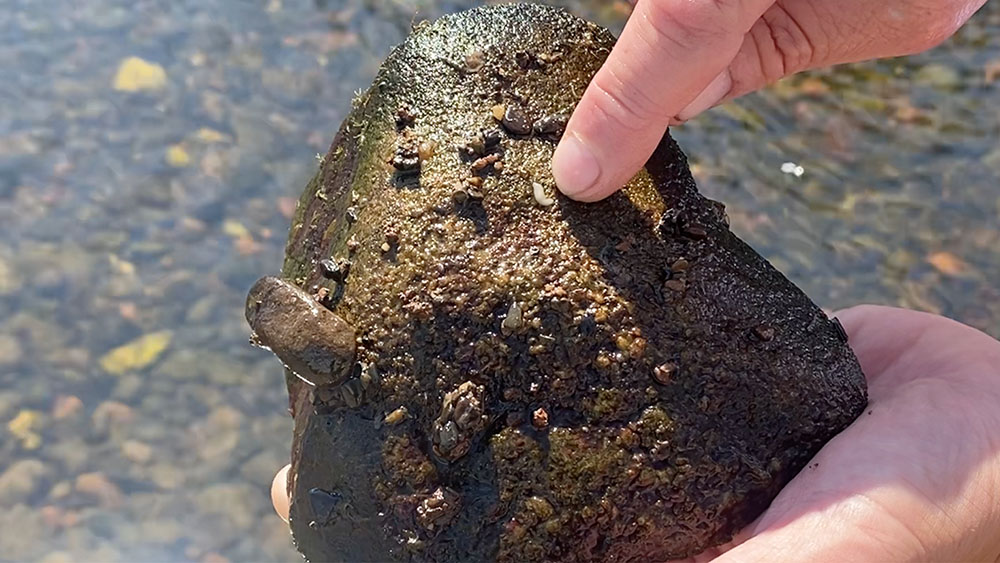
“These organisms, these living things, that’s all from just one tiny, standard rock I found in the river,” David says. “There’s more where that came from, and people aren’t getting that nowadays.”
From afar, a groups of geese started to fly into a herd and park themselves on a piece of stone that was on the edge of the river where we were. They squeaked in union and looked over in our direction. David recognized the type of breed right away.
“Those are canadian geese, they are quite common to be seen on the Wye,” he says. “They don’t seem like they’re suffering on the river, now do they?”
Now was the real test, feeling the coarse of the river. We walked back to his truck and got suited up into some fishing gear to walk into the Wye. David handed me a pair of wading boots and polarized glasses like the ones he was wearing so I could see the species swimming in the Wye.
Each step we took into the water, we could feel the rushing flow of the river Wye on this warm summer day, which adapted to the hot temperature. As I walked with David, I looked down at my feet and saw dark, snake-like leaves which looked like ranunculus plants, surrounding us.
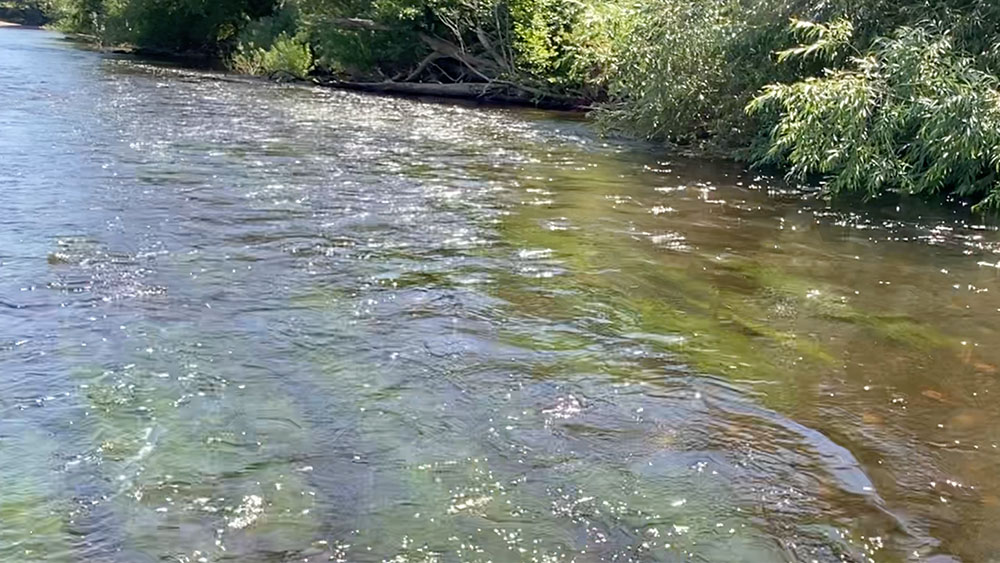
The river Wye has a very coarse river bed that is made up of rocks and steep gradients. While wading through the flow of the water, there were often times where David would recommend stepping in a pattern to avoid getting swept away.
“Some of this erosion you may be seeing is because of droughts and flooding that has happened in the past,” David says.
Severe winter flooding occurred across the UK from November 2019 to February 2020. In February, Herefordshire had the biggest flood in the river Wye due to Storm Dennis.
According to GOV UK, most of the country received the February whole-month average rainfall over a 9-day period, with Herefordshire and Gloucestershire receiving 200% of rainfall. As a result, many homes were displaced along with agricultural farms and wildlife.
“Backs of gravel were appearing in weird places, ranunculus weeds from the river had immediately disappeared, it became a catastrophe for the local community,” says David.
The river Wye reached its highest ever recorded level of 6.3 meters (20.7ft) which resulted in 60 billion liters of soil from agricultural farms passing under the Hereford Bridge. This crisis held the community back for a while.
David and his friends, who depend on the river for their livelihood, have witnessed the devastating impact of flooding on the river’s ecosystem firsthand. They have observed a significant decline in aquatic life due to the flooding. However, Dave believes that the situation has improved since then, and the water quality has shown signs of recovery.
When others began attributing the loss of life in the river to poultry farming, Dave felt compelled to speak up and share his firsthand account of the situation. He wanted to clarify that the flooding, not poultry farming, was the primary cause of the decline in aquatic life.
“What I started to question is the state of the river, when many people were saying that it was dead by that point due to farming. After the flood, I spent every day of my life on this river and people that I’ve worked with for my business have had the most incredible experiences,” Dave says.
As we started to walk out of the water, David ran back to his truck to get his fishing rod and his bait box. The time had come for him to show off his fishing skills in the river Wye.
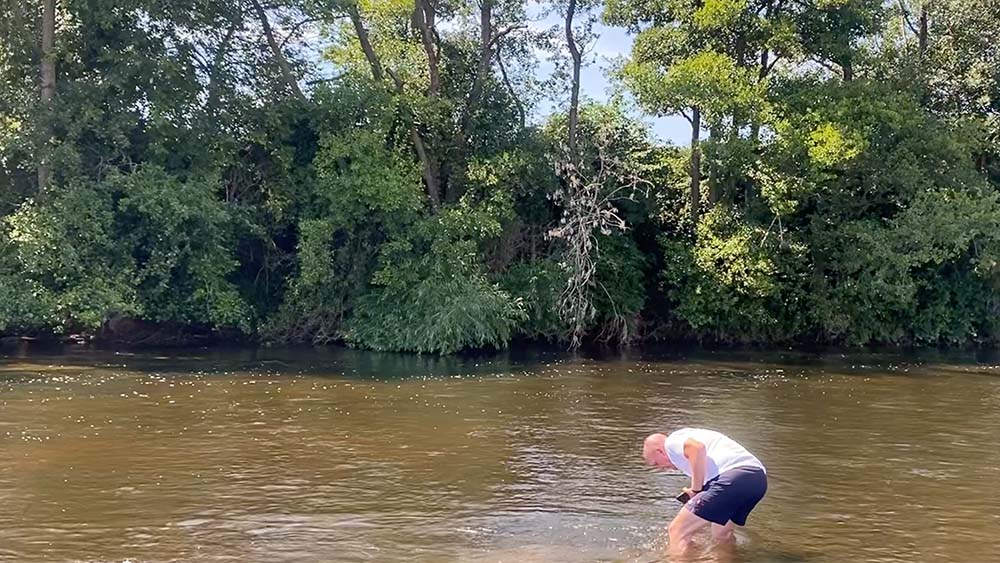
Looking at the fishing population as a whole, the one species that has been claimed to be at stake is the Atlantic salmon population. David has been preaching in river Wye interest groups on social media that this isn’t the first time it has declined.
In the 1980s there was a sharp decline of Atlantic salmon from seven million to five million, known as the pre-fishery abundance. According to NASCO, the rate of decline for the atlantic salmon population between 1983 to 1990 has been linked towards climate change and changing temperatures in the Northern Atlantic sea.
David has preached to many people about this issue before poultry farming became an issue in the UK but has been shouted at, disregarded and even banned from facebook groups including the Save the Wye Facebook group.
“Salmon disappeared from this river fast in the 90s and no one has pinpointed what the problem was there” he says. “Salmon are declining across the whole world. The graphs showing they’re declining in the Wye is the same as all the other graphs for other rivers, the problem is that we’re from a slightly lower starting point because of what happened back then.”
Standing on the pebbled bank, David prepares his fishing rod, his hands moving with practiced ease. With a final check of his bait and a glance at the river’s gentle current, he takes a deep breath, savoring the quiet anticipation before the cast.
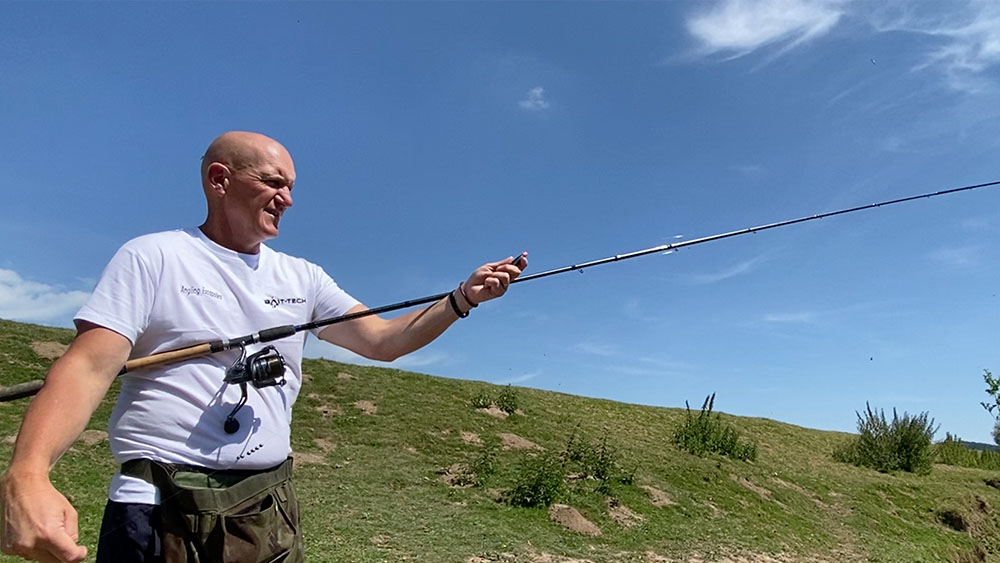
The rod arches back smoothly, ready to send the line flying across the shimmering water. It was only a mere five minutes before his rod started to tug a bit forward in the water, only meaning one good thing can come from that.
He casted in his rod and pulled up a small, silver fish from the water, then walking out of the water to further examine it’s chemistry.
“Its’a chub fish. They’re normally in these waters, especially during the summer and on a hot day like today. But, this just goes to show that there is nothing wrong with our waters,” David says.
He continued to cast his rod and grab at least four more chub fishes. The sound of his rod casting back and forth brought pleasure to him. It was almost like looking at him in his natural habitat, doing what he does best.
Throughout the years, his stance on the river Wye’s ecology and health has been debated amongst the activist community. Certain feathers were ruffled in groups like Save the Wye and Friends of the Wye for sentiments Dave had shared on how he thought the river was actually doing.
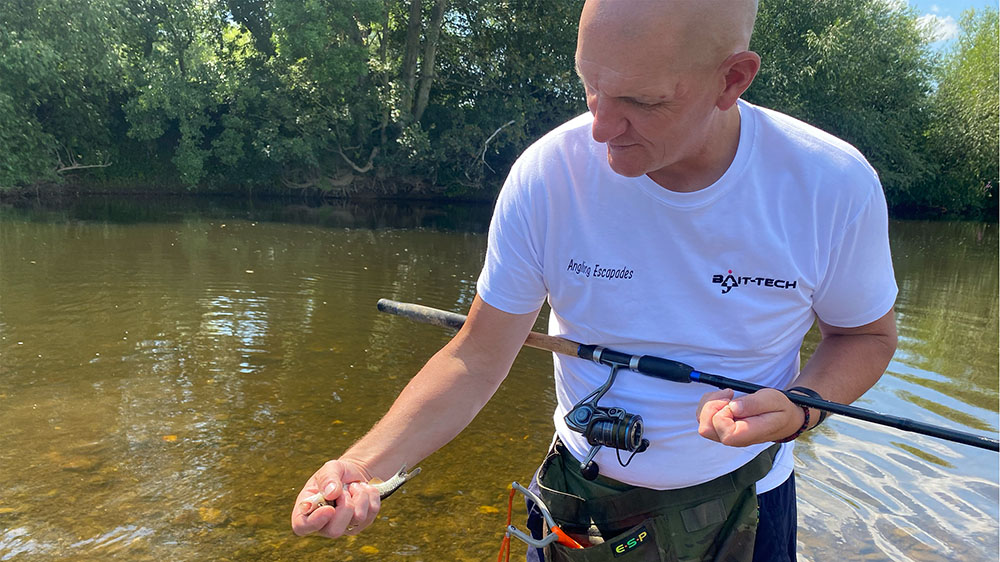
During the Leigh Day showcase in Hereford in July, which was in support of creating a judicial lawsuit against chicken farming company Avara, and the Environment Agency, David attended to hear everyone’s thoughts and opinions.
“His way of speaking to people in the group is quite a lot to be honest,” says Ian Hague, who is on the committee board for the Save the Wye coalition. “I’m curious to know what his goal is as an angler and speaking about a topic like this.”
David’s main worry about the river is the lack on focus of what really matters to him. Besides the sewage problem, operations of water irrigation happen within the river.
As we walked to another fishing post called ‘‘Roaring Rocks’ he spotted three commercial turf operations that were pumping water from the river Wye.
“How can that be right when the river is in a drought, hunking out what is to be believed a commercial operation,” says David.
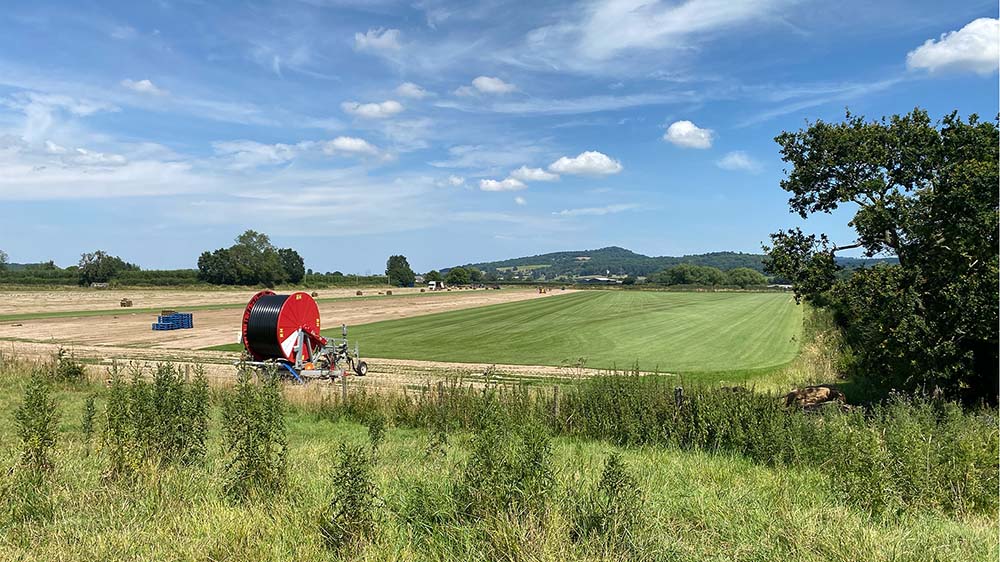
Water abstraction from the river Wye has become a rising concern for Herefordshire residents. Due to increasingly hot summers and elongated drought periods, species are already getting exposed to extreme measures.
If abstraction is added to the picture, this can create a picture of lower water levels. David believes this is where the money should lie on, not agricultural farming.
His concern for these types of projects carried out by the EA are what he thinks activists should really be focusing on.
“It’s all snowballed and become something it’s not. This river has faced dangers all the time and I feel we’re overlooking that because people are so obsessed with the poultry industry and looking for that golden lawsuit,” says David.
Academics have recently started look into the possibility of more commercial turf operations within the Wye catchment. Professor Steve Ormerod from Cardiff University has witnessed the same sentiments as well.
“Intensifying agriculture along rural rivers is certainly a much bigger issue than sewage – although wastewater treatment issues increase downstream of Hereford. David’s right that the Wye is not in its dying days – but it is changing,” says Professor Ormerod.
We continued our last stretch of the river at a final post David goes to called ‘Redbank’. We got closer to the greener parts of the river and saw some people swimming and a family pass by in a canoe, which was the perfect day for that activity.
David turned around and pointed out a noise of grunt, footsteps coming towards us. Out of the bushes appeared two wild horses form a nearby farm, who approached us and started to sip the water from the river Wye.

The future of the Wye lies in the hands of how it is managed by the government. People like David, who are out on the river every day hope that their voices will be heard amongst the masses of people who think it is too late to save the river.
“Theres lots of threats and lots of things we should be protecting this river from but anybody who says this river is destroyed is talking rubbish,” says David.
